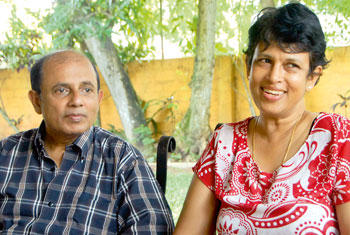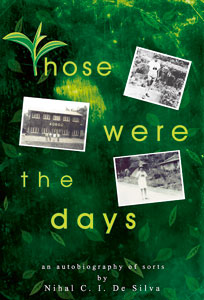July 29, 1987: Indian Prime Minister Rajiv Gandhi and Sri Lankan President J.R. Jayewardene meet in Colombo. Planter, Nihal de Silva and his family watch on T.V as the accord that will bring the IPKF to Sri Lanka is signed. For President Jayewardene, his decision brings consequences that culminate in the transfer of his office to a man waiting impatiently in the wings.
Ranasinghe Premadasa would take over as President in 1989 and one of his first edicts would demand the withdrawal of IPKF. However, before that, while he was still Prime Minister, he would spend four days at the Hope Estate in Hewaheta, Nuwara Eliya, with the de Silvas.
They would have glimpses of the things that Premadasa would become famous for, such as his determination to bring development to rural Sri Lankans. But on the first day of his visit, for the family there were other, more immediate concerns - they feared their youngest daughter had just succeeded in incurring the wrath of a Prime Minister.
 |
| Joint effort: Nihal de
Silva and wife Priyanthie |
In his forthcoming book ‘Those Were the Days’ Mr. de Silva remembers the encounter: ‘The day dawned bright and clear! I had invited the Chairman of the Kandy JEDB office, the Regional Chairman, Managers of the nearby estates etc. to greet the VIP. My wife had prepared vegetarian delicacies for tea and all was in readiness. My three daughters aged three, seven and ten respectively, were scrubbed, dressed up and brought forward to be displayed.
The visitors arrived and our youngest daughter took one look at him and said, “There Dada, Preme!” I could have died!’ Mr. de Silva knew the next question would be “Where’s Heme?”(Mrs.Hema Premadasa). Quickly gathering up his child, he addressed Prime Minister Premadasa – “please excuse her, she’s only two years old (made a year younger immediately) and doesn’t know what she’s saying.” Instead of being incensed, Premadasa was clearly pleased – to be so easily recognized by a two year old! “Give me two more years,” he told the de Silvas and “every child in the country will know who I am.”
Premadasa was to stay with the de Silvas at the request of the local MP – their estate bungalow was deemed the only one in the region large enough to host such a distinguished guest. The occupants of a nearby hospital were moved to another hospital to make room for the Prime Minister’s entourage and travelling security force of a hundred men. They had been warned that their guest had very specific requirements. ‘The PM who was a pure vegetarian, would have his personal chef and the only addition to the house, (to the toilet in fact) was a zig-zag mirror which could be brought up close to the face, for shaving purposes and a bidet,’ writes Mr. de Silva. ‘He was a down-to-earth person who liked plenty of fruits, papaw in particular and vegetables like cauliflower, asparagus and broccoli, which he grew in a green-house, at the rear of his official premises.’ He adds that Premadasa was ‘fanatical about his good health.’
As the host of the P.M, Mr. de Silva found himself on guard duty. That night Mr. de Silva went to sleep with a 9mm hand gun under his pillow and one pump action, long range barrel gun under his mattress. “At 4 a.m (even my toes don’t get up till 7) there was this heavy knocking on the door. I immediately grabbed my gun and went to answer it.” The man standing on the threshold told him that the P.M wished to speak to him. Imagining scenarios that ranged from being made ambassador to having to mount an impromptu attack on unknown assailants Mr. de Silva slid his gun into his pocket, gathered some extra ammunition and made his way to the Premier’s room.
His preparations proved unnecessary – instead the story that follows involves the abrupt dismissal of the head of security over a charge of unseemly inebriation. That Premadasa considered 4 a.m. an appropriate time to have this conversation is a reminder that the man seldom wasted an hour of his day – and that he expected those around to do no less.
Please turn to Page 7
Of political guests
Over the next four days, the de Silvas would see the Premier mostly at dinner. “His conversations ranged from why the plantation managers were not selected from the rural schools to his plans for a ‘Sri Lankan Singapore’ in 10 years,” remembers Mr. de Silva. Premadasa also shared his opinions on the Indo-Sri Lanka accord. “He had objected to the presence of the IPKF right from the very inception. He seemed afraid that like in Japan, Germany and Korea, where the US troops are yet in operation, 60 years after the war, the IPKF would be here and further strengthen their position in other parts of the island as well and thereafter dictate terms to us.”
 |
Mr. de Silva’s stories provide a fascinating glimpse into a pivotal period in Sri Lanka’s history. Growing up, Mr. de Silva’s family shared close ties with the Bandaranaikes (Mrs Sirimavo Bandaranaike would often come over to their house and ask his mother, her school friend, for a cup of their estate tea) among many other prominent Sri Lankan families. Mr. de Silva himself would become a close friend of consecutive American ambassadors. (One of them, James W. Spain, left Mr.de Silva small stipend in his will, but Mr. de Silva cherishes it more for the fact that his name appears alongside that of a Kennedy in the will.) Later on, he even had a brief chat with Queen Elizabeth II.
Over the course of over two decades as a tea planter, Mr. de Silva lived through two tumultuous JVP insurgencies – the first in 1971 and the second in 1987. He would run their family plantation for two years after their Manager and his son were torched by the JVP for not observing a strike day. As a Captain in the ‘Ceylon Planters’ Rifle Corps Volunteers’, formed by the British in 1912, he himself helped police the Uva region and had his own close brush with the JVP, at one point facing down a crew sent to execute him outside his house in the night. Dubbed ‘gunman’ by his contemporaries, Mr. de Silva was a collector of guns and an avid boar hunter. A fan of Elvis Presley, he could be seen striding about the estates with his hair done in a pompadour, in honour of his idol. That is how Priyanthie de Silva, his wife of 38 years, remembers him.
Today, she sits beside him, having helped him edit ‘Those Were the Days’ which begins in 1951 and ends in 2009. His book he says is written primarily in a conversational style and brings together a series of anecdotes from this period. Covering the spectrum from harrowing to humorous, they begin with his childhood and go into the years he served as Plantation Manager and the Regional Chairman of the Ceylon Planter’s Society – ‘the dirty dozen’ who had the ear of President J.R Jayawardene. He would go on to serve as a Personal Assistant to the late Minister Ranjan Wijeratne and later joined Shell Gas Lanka as its Head of H.R - just two among many, many postings in a long career. Now, officially retired, Mr. de Silva says he is looking forward to his first grandchild. He seems well content: “I read many years ago that every man’s dream is to marry well, to work for a good company, and to write a book. I thought I had done the first two and now I have done the third.”
‘Those Were the Days’ will be available on sale at Godage International Publishers Ltd Maradana, Vijitha Yapa book shops and Odel bookshop from June 24. It is priced at Rs.850 for the hard cover and Rs.550 for the paperback version. |



